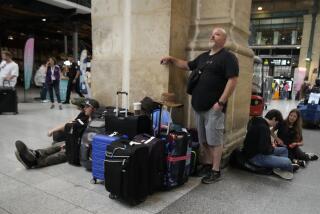Europeans Are United I Anger, Fear, Resignation
PARIS — European officials moved quickly Friday to step up security in the continent’s capitals after bombings the day before in London. But many ordinary citizens, especially commuters, expressed a sense of apprehension and resignation over the seeming inevitability of attacks on their soil.
From Berlin to Madrid and from Paris to Prague, more police were patrolling transit systems and surveillance was beefed up at airports. In some cities, there were public announcements asking people to be on the lookout for anything suspicious, especially unattended parcels, knapsacks or luggage.
Charles Blackmore, managing director in Europe and the Middle East for Vance International, a private security firm, said law enforcement officials were seeking a balance between preventing terrorism and intruding on commerce and personal lives.
“It’s a fine line between taking overt security measures and disrupting everyday life,” said Blackmore, a former counter-terrorism officer in the British army. He added that there was far more reluctance in Europe than in the United States to add uniformed officers to the streets.
“That gives oxygen to the terrorists,” he said. “It makes it look as if they have succeeded in putting us on the defensive.”
Still, the public often draws solace from the sense of safety uniformed officers provide, and expresses dismay when they are absent.
“The measures taken in France were chosen to show the population that the government is doing its best to secure public places,” said Louis Caprioli, a former intelligence official who is now a consultant for a risk-prevention company. The presence of more uniformed police could dissuade “individuals carrying bags of explosives,” he said.
In Italy and Austria, the governments announced that they would increase the presence of undercover officers in public places. Austria put sky marshals on its flights to London and asked police to be on the lookout for anything suspicious.
In Germany, officials ordered an increased presence of uniformed and undercover police, and state and city officials in Berlin convened a security meeting within hours of the London attacks to discuss how the city would respond if there were similar bombings there.
Commuters on the Prague subway said they had seen at least three uniformed police officers at each station, more than usual. And in Paris, a Metro commuter who would identify himself only by his first name, Fabrice, said: “You can tell it’s not the same as yesterday. There are soldiers everywhere. You feel the city is under siege. I was at Gare de Lyon [train station] and there are more policemen than travelers.”
Most European countries raised their official security alert levels after the London bombings. Spain, which also sharply increased its police presence on the streets and at train stations, put itself at maximum alert.
Despite the stepped-up security, government officials appeared to take the situation in stride. They noted that Europe had seen many attacks in recent decades, including assaults by the Red Brigades in Italy, the Irish Republican Army in Britain, the Basque separatists in Spain and a host of other groups.
But the difference from the standpoint of most Europeans is that those attacks often targeted institutions or politicians and were preceded by warnings apparently intended to reduce civilian casualties.
More recent attacks, such as the London blasts and last year’s bombing of four Spanish commuter trains, apparently were designed to cause maximum civilian casualties.
“Whoever puts those bombs should stop killing innocent people,” said Fiorella Cimininelli, 44, a hairdresser in Rome, who stopped taking the subway after the Sept. 11 attacks. “They should target directly the people they disagree with.”
In countries where there has been little or no threat, there was a marked tendency to discount the likelihood of an attack. In Denmark, which was named by a militant website as a possible target because it has more than 500 troops in Iraq, Anja Dalgaard-Nielsen was almost dismissive.
“As a Dane, you are still at bigger risk of dying due to passive smoking or obesity than a terrorist attack,” said Nielsen, a fellow at the Danish Institute for International Studies.
And in Austria, a country that prides itself on its neutrality, there was little evidence of fear, even among people who work on commuter trains. Hans Buchberger, a train conductor at the Westbahnhof, one of Vienna’s biggest railway stations, said the Austrian Railway Co. had given no instructions to maintain a higher level of vigilance.
“Anyway, the politicians on TV have said that for us there is no reason to worry,” he said.
But many of the people interviewed in Europe said the London attacks had renewed their fears of an assault on their countries. They expressed anxiety, a sense of powerlessness and anger.
Some told themselves they would be safer if they took public transport only in the evening, because they thought bombers struck mostly in the morning. Others said they believed subways were more dangerous than buses. In the end, most felt torn between changing their lives to protect themselves and going on with things as normal and accepting some level of risk.
“I had quite a bit of a bad feeling when I squeezed myself into the completely crowded subway car this morning,” said Laura Mayer, 21, a medical student in Berlin.
“But what can I do? The alternative is a one-hour bicycle ride through the morning rush-hour traffic jam,” she added. “I think this is way more dangerous than the slight chance of being blown up by terrorists. But I have to admit: I have started to look for bags standing around. And I would avoid the proximity of nervous-looking Arabs. Not that I saw some, but I have that in the back of my mind.”
Others worried that their governments were doing too little to protect them. Anxiety ran particularly high in Italy, which has 3,000 troops in Iraq. The website for the Secret Organization of Al Qaeda in Europe, the group that claimed responsibility for the London bombings, said Italy would be its next target, along with Denmark.
“I don’t feel safe at all, but I am forced to take a train and then the underground in order to come to work,” said Gabriella Terrinoni, 37, a shop assistant in Rome. “It’s unbelievable that there are no controls. Not even after what happened yesterday. No policemen with dogs, no security whatsoever. Anyone could easily place a bomb.”
In Spain, the mood appeared fatalistic. The train bombings last year, blamed on a group linked to the Al Qaeda terrorist network, killed 191 people and shattered the country’s sense of invulnerability.
“I still feel an air of worry in the train. We can’t forget what it was like here” when the attacks happened, said Roberto Ariani, 41, a real estate agent from Malaga who was on holiday in Madrid.
“Nobody is free of it. No city in the world is safe. The war against fanaticism is the worst kind of war. The U.S. suffered, then Spain and now the U.K.,” he said. “Spain is a secure country, as is the U.S. and U.K. This is beyond security. The terrorists are here among us.”
*
Times staff writers Maria De Cristofaro in Rome, Christian Retzlaff in Berlin and Achrene Sicakyuz in Paris and special correspondents Helen Hajjaj in Copenhagen, Cristina Mateo-Yanguas in Madrid and Elisabeth Penz in Vienna contributed to this report.
More to Read
Sign up for Essential California
The most important California stories and recommendations in your inbox every morning.
You may occasionally receive promotional content from the Los Angeles Times.










